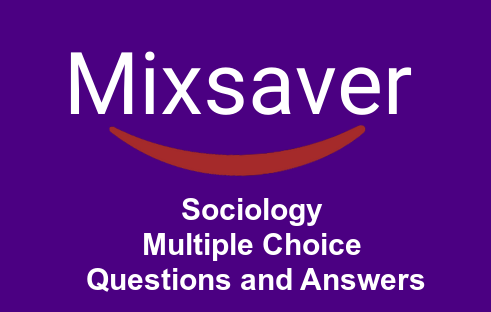Sociology MCQs | sociology objective question
1. The word “Sociology” is derived from-
(a) Society and logus
(b) Society and study
(c) Societus and logos
(d) Societus and study
Ans. c
2. The term Sociology was coined by-
(a) Maciver and page in 1876
(b) Auguste Comte in 1839
(c) Aristotle in 1739
(d) Simmel in 1860
Ans. b
3. “Man is a social animal” who said-
(a) Aristotle
(b) Plato
(c) Herbart Spencer
(d) Carl Marx
Ans. a
4. Sociology is the-
(a) Study of health system
(b) Study of human behaviour
(c) Study of society
(d) Study of socio-economic institutions
Ans. c
5. Who said – sociology is a “value free science”
(a) Max Weber
(b) Raymond Murry
(c) L.F. Ward
(d) Herbert Spencer
Ans. a
6. Who said “Where there is life, there is society”.
(a) E.B. Tylar
(b) Bogardus
(c) Herbert Spencer
(d) MacIver & Page
Ans. d
7. What was the reason of origin of society-
(a) Revolution
(b) God’s will
(c) Evolution
(d) Competition
Ans. c
8. Sociology is a-
(a) Natural science
(b) Social science
(c) Applied science
(d) Physical science
Ans. b
9. “Sociology is a science for scientific development” this definition of sociology was given by-
(a) G.D. Mitchell
(b) Mac Iver & Page
(c) Max Weber
(d) Carl Marx
Ans. a
10. In sociology the word society is used for –
(a) The persons living in a definite geographical area
(b) The persons of same religion
(c) Groups and institution
(d) The system of social relationships
Ans. d
sociology mcq questions pdf |mcq on sociology
11. Which of the following is characteristic of society-
(a) Inter-dependence
(b) Differences and likeness
(c) Reciprocal social relationship
(d) All of the above
Ans. d
12. “Society is a network of social relationships” was said by-
(a) Ogburn
(b) Devis
(c) Maclver
(d) Cooley
Ans. c
13. One of the shortcoming of sociology is-
(a) Lack of Experimentation
(b) Lack of exactivity
(c) Lack of objectivity
(d) All of the above
Ans. d
14. Which of the following statement is correct about society-
(a) Individuals can exist without society
(b) Society is the scientific study of social relationships
(c) Individual and society are interdependent
(d) Both (b) and (c)
Ans. d
15. Which of the following statement is true-
(a) Society means likeness
(b) Society means mutual aids
(c) Society implies differences
(d) All of the above
Ans. d
16. Which of the following is a element of Community-
(a) Definite geographical area
(b) Group of people
(c) Community sentiment and we feeling
(d) All of the above
Ans. d
17. “Man is a social animal” because-
(a) Man’s nature and need make him so
(b) Society was born with him
(c) He has been living in society since the birth of civilization
(d) None of the above
Ans. a
18. Language is important to society because-
(a) Without language men can not exist in society
(b) It makes social contacts easy
(c) It satisfy man’s need of expression
(d) None of these
Ans. b
19. Which the theory shows many points of resemblance between society and human body-
(a) Natural theory
(b) Cultural theory
(d) Evolution theory
(c) Organic theory
Ans. c
20. Which of the following is the correct theory of the origin of the society-
(a) Carl marxs theory
(b) Social contract theory
(c) Theory of divine right
(d) Evolution theory
Ans. d
sociology mcqs with answers pdf
21. The unity and stability of the Indian society depends upon-
(a) Class system
(d) None of the above
(c) Caste and religion
(b) Religion and culture
Ans. c
22 Man’s behaviour in society is determined mainly by-
(a) Formal and informal forces
(b) Natural and unnatural forces
(c) Physical and social forces
(d) None of the above
Ans. c
23. A group of people organised for a particular purpose is known as-
(a) Community
(b) Society
(c) Association
(d) Crowd
Ans. c
24. Which of the following is a element of community-
(a) A group of people
(b) Definite locality
(c) Common modes of life
(d) All of the above
Ans. d
25. Which of the following agency is responsible for process of socialization-
(a) Family
(b) School
(c) Peer group
(d) All of the above
Ans. d
26. Socialization is a process which-
(a) Regulates human behavior
(b) Continues throughout life
(c) Is based on learning process
(d) All of the above
Ans. d
27. Which of the following is not a unit of social structure-
(a) Groups
(b) Associations
(c) Social unity
(d) Institution
correct Ans. c
28. Which of the following statement is correct about accommodation-
(a) Accommodation is a social process
(b) Accmodation is a continuous and universal process
(c) Accomodation is the natural result of confic
(d) All are correct
Ans. d
29. Which of the following is not a associative social process-
(a) Cooperation
(b) Competition
(c) Assimilation
(d) Integration
Ans. b
sociology mcq questions
30. Assimilation is a-
(a) Associative social process
(b) Dissociative social process
(c) Psychological process
(d) Mental process
Ans. a
31. Competition is a –
(a) Mental process
(b) Political process
(c) Economic group
(d) Social process
Ans. d
32. Which among the following is based on direct co-operation-
(a) Government
(b) Church
(c) Family
(d) Economic institution
Ans. c
33. An association is characterized by-
(a) Customs
(b) Norms
(c) Mores
(d) Habits
Ans. b
34. Which among the following is an organisation-
(a) School
(b) Hospital
(c) Court
(d) All of the above
Ans. d
35. Which of the following is not an organisation
(a) Factory
(b) School
(c) Court
(d) Many foreigners in Mumbai
Ans. d
sociology chapter 1 multiple choice questions
36. The nature of a crowd is-
(a) Transitory
(b) Continous
(c) Permanent
(d) Stable
Ans. a
37. Which of the following is not a characteristic of cast-
(a) It is determined by birth only
(b) Restriction on marriage
(c) No restriction on occupation
(d) Restriction on food habit
Ans. c
38. Human society has been cradled in rural groups, who said-
(a) Bogardus
(b) Ginsberg
(c) Maciver
(d) Kimbal young
Ans. c
39. Status and rank characterise the members of-
(a) Community
(b) Society
(c) Group
(d) Caste
Ans. d
40. Which of the following is an organisation-
(a) World Bank
(b) U.N.O.
(c) RSS
(d) All of the above
Ans. d
41. Herbert spencer is the author of-
(a) Class struggle
(b) Revolution
(c) Social evolution
(d) Independent India
Ans. c
sociology mcqs css
42. Which of the following is an example of an association-
(a) State
(b) Trade union
(c) Cricket club
(d) All
Ans. d
43. Caste is an examples of-
(a) Achieved status
(c) Pre-set status
(b) Ascribed status
(d) None of the above
Ans. b
44 “Group is a collection of human beings who are brought into social relationship with one another”. Who gave this definition-
(a) Maciver
(b) Ogburn
(c) Kingsely Devis
(d) Max Weber
Ans. d
45. Which of the following is a characteristic of a social group-
(a) Reciprocal relations
(b) Sense of unity
(c) Common interest
(d) All of the above
Ans. d
46. “We feeling’ is a essential feature of-
(a) Nationality group
(b) Racial group
(c) Primary group
(d) Secondary Group
Ans. c
47. Which of the following is a primary group-
(a) Trade union
(b) School
(c) Political group
(d) Family
Ans. d
48. Which of the following is an example of secondary group-
(a) Family
(b) Political party
(c) Labour union
(d) Both (b) and (c)
Ans. d
49. Which of the following is not a secondary group-
(a) A peer group
(b) Labour union
(c) Neighbourhood
(d) Both (a) and (c)
Ans. d
sociology mcqs book pdf
50. An In-group is characterised by-
(a) Feeling of difference
(b) Intimate and personal relationship
(c) Formal relationship
(d) Jealous feeling
Ans. b
51. Which of the following is a component of group life-
(b) Common interest
(a) We-feeling
(c) Sense of unity
(d) All
Ans. d
52. Groups were classified into primary groups and secondary groups by-
(a) Cooley
(b) Sumner
(c) Ginsberg
(d) Gillin and Gillin
Ans. a
53. Which of the following is not a primary kin-
(a) Mother
(b) Father
(c) Brother
(d) Wife’s brother
Ans. d
54. The rule that one must marry within one’s own caste, is called-
(a) Exogamy
(b) Endogamy
(c) Monogamy
(d) Polygamy
Ans. b
55. Exogamy is defined as-
(a) Marriage outside the group
(b) Marriage within the group
(c) An experimental marriage
(d) None of the these
Ans. a
56. Which of the following is the most common form of marriage in the world-
(a) Polyandry
(b) Monogamy
(c) Polygyny
(d) Sororal
Ans. b
57. Essential function of family is-
(a) Sexual satisfaction
(b) Procreation
(c) Provision of home
(d) All
Ans. d
58. The rule of residence generally followed in a society is-
(a) Petri-local
(b) Matri-local
(c) Bio-local
(d) None of the above
Ans. a
59. Polyandry is the form of marriage which means-
(a) One woman marries several man
(b) One woman has one husband
(c) One man marries more than one woman at a time
(d) Live in relationship
Ans. a
ppsc past papers of sociology solved pdf
60. Which factor does not affect population density-
(a) Climate
(b) Surface of land
(c) Fertility of soil
(d) Pollution
Ans. d
61. Which of the following state has the largest
(a) Madhaya Pradesh
(b) Uttar Pradesh
(c) Rajasthan
(d) Maharashtra
Ans. b
62. Which of the following continents contains maximum population-
(a) Africa
(b) Asia
(c) Europe
(d) Europe
Ans. b
63 Which of the following is not a characteristic of rural community-
(a) Joint family
(b) Simplicity of life
(c) Community consciousness
(d) Social distance
Ans. d
64. A scientific study of relations between organism and environment is known as-
(a) Demography
(b) Physiology
(c) Zoology
(d) Ecology
Ans. d
industrial sociology mcq
65. “Population when unchecked increases in geometrical ratio, subsistence increases in arthmetical ratio.” who said these words about population growth-
(a) Freud
(b) Auguste Comte
(c) Malthus
(d) Carl marx
Ans. c
66. Social stratification means-
(a) Social equality
(b) Social control
(c) Social inequality
(d) Social change
Ans. c
67. The caste system is-
(a) Unique in India
(b) A Social institution
(c) Has made segmental division of society
(d) All of the above
Ans. d
68. Social stratificaiton means-
(a) Classification of society into group and intergroup
(b) Classification of society into castes and class
(c) Classification of society into religious ana economic group
(d) All of the above
Ans. b
69. All of the following factors have contribuleu break the caste system in India except
(a) Constitution and democracy
(b) Industrialization and urbanization
(c) The policy of reservation
(d) Means of transport and communication
Ans. c
70. Mobility is the feature of-
(a) Caste system
(b) Class system
(c) Both (a) and (b)
(d) None of the above
Ans. b





